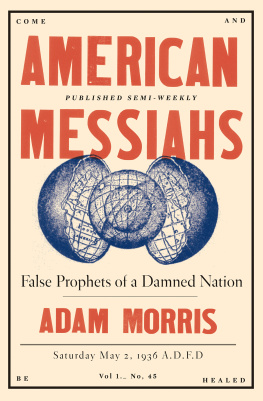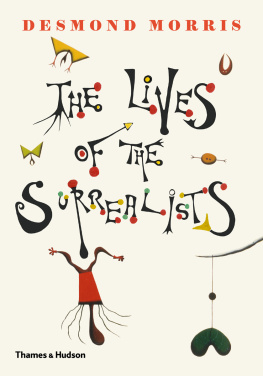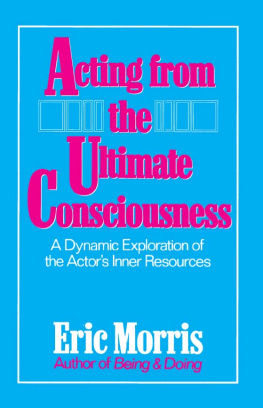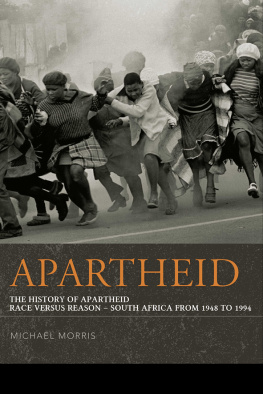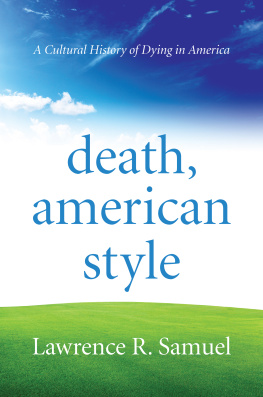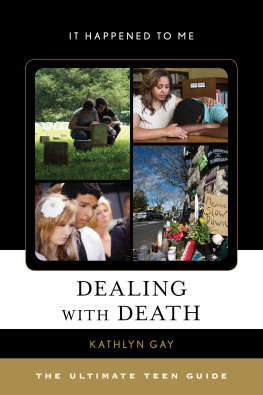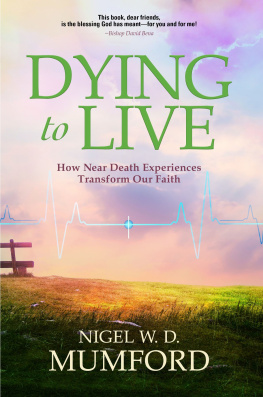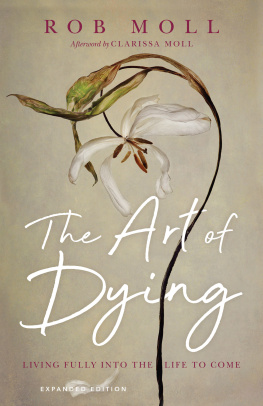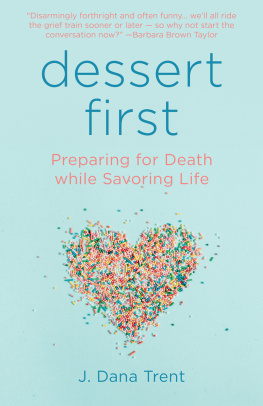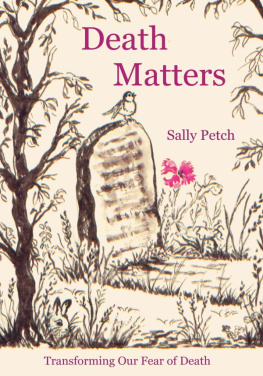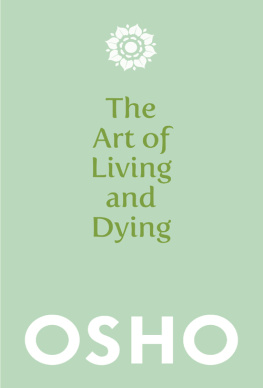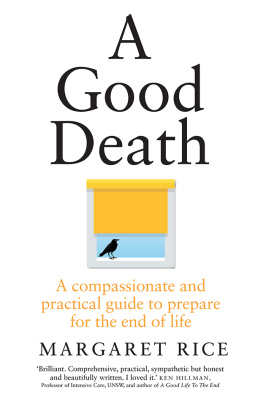
Praise for Talking About Death
[An] important new book a wake-up call on the need to approach death consciously. Morris makes the strong case that the end of life can be one of our most beautiful experiences, if we prepare for it.
Los Angeles Times
A practical book on a touchy subject belongs in every self-help collection.
Booklist
Offering a wealth of information on Do Not Resuscitate orders, pain medication, living wills and hospice care, Morris provides a useful, clearly written and thought-provoking analysis.
Publishers Weekly
Weaves personal tales and practical details together to empower the living and dying.
Syracuse Post-Standard
Readable and well-written. Combining personal stories and practical advice, sociology and emotional sensitivity, [Morris] covers every aspect. In search of the good death, ars moriendi, we can learn to live a better life, ars vivendi Thoughtful and thought-provoking.
The Huntsville (Alabama) Times
This book is not clever. It is wise. [Morris] constructs a richly layered collage in which philosophy and poetry, factual reportage and personal anecdotes, case studies and research come together in a (believe it or not) page-turning format.
The East Hampton Star
Talking About Death
Virginia Morris
Algonquin Books of Chapel Hill
Published by
Algonquin Books of Chapel Hill
Post Office Box 2225
Chapel Hill, North Carolina 27515-2225
a division of
Workman Publishing
225 Varick Street
New York, New York 10014
2001 by Virginia Morris. All rights reserved.
Library of Congress Cataloging-in-Publication Data is available.
eISBN 9781565128477
many thanks
If you want to know who your real friends are, write a book. There you are, fretting about deadlines that you cant possibly meet, glumly acknowledging deadlines that have passed, taking about death again, wondering why you ever took on the subject, and calling people in a panic because it has dawned on you that you will never actually finish this book. Good friends listen to all of this and love you anyway. I have truly incredible friends, and that is, without a doubt, why this book exists. To all of them, thank you, thank you, thank you.
I am indebted to a long list of experts who guided me along the way, especially Dr. Margaret Drickamer, Dr. Sherwin B. Nuland, Priscilla Ruffin and all the great people at East End Hospice, Dr. Kathleen Foley, Dr. David Weissman, and, indirectly, Dr. Joanne Lynn.
I want to thank, from the bottom of my heart, all of those who shared their stories, and their tears, with me. When you talk with someone about death, it removes any barriers, any distance that might otherwise exist. You become linked, on some level, for good. I couldnt be linked to a better bunch of people.
I am also deeply indebted to a few friends who not only supported me through this process, but read my manuscript, commented on it (pretty honestly, in some cases), and made it far better than it would have been otherwise. In particular, Tina Raymond, who read it not once, but twice, Marjorie Cave, Lou Ann Walker, Susan Merrell, Richard Ives, and Michael Shnayerson.
Enormous thanks to my remarkable editor and friend, Suzanne Rafer, who poured so much of herself into this that its a wonder theres anything left of her; to the ever calm and wise Peter Workman, who can count me as one of his many loyal fans; and to so many others at Workman Publishing, including my dear pal Jenny Mandel, who exudes energy and optimism, Jim Eber, Janet Hulstrand, and Paul Gamarello. Many thanks also to Elisabeth Scharlatt and Kathy Pories at Algonquin for continuing to believe in this book.
Last, but certainly most, I am grateful to my adorable husband, Bob Plumb, who doesnt particularly like talking about death but who has listened to me talk about little else for the past few years; to my irresistible children, who feed my soul; and to my incredible mother and siblings, who always believe in me more that I believe in myself.
Thank you.
For Marjorie Austin Morris,
my mom, my friend, my soulmate, my lifeline
contents
a word of un-warning
reading about death wont kill you
Why read a book about death when the subject is so unnerving, when the mere mention of words like lump, malignant, and chemo can send a persons system into adrenal overdrive?
When I started this project a friend of mine called me, all upset. She felt that this endeavor was not only morbid, but dangerous. By studying death, she said, I might make it happen. A friend of hers had died of cancer while studying Portuguese death rituals. I, too, might be on a suicide mission. This subject was better left untouched.
Her concerns may seem a bit odd at first, but they are not unusual. Death is the boogeyman, hiding in the shadows of our bedrooms, arousing all sorts of anxieties and fearssome valid, some silly, some we dont readily admit even to ourselves. Most of us cant imagine the end of our existence as we know it. We dread the process of dying, the pain and disability. We panic at the thought of leaving loved ones, or having them leave us. Afraid of death? one friend responded incredulously. Of course Im afraid of death. Im afraid of not being invited to a party. Death is the ultimate exclusion from the party, isnt it? Whatever the particulars, all of usthe rich, the poor, the brilliant, the brave, the faithful, the atheistic, the young, and the oldall of us are touched in some way by fear and dread.
From a distance, when death is safely removed from our own lives, it intrigues us. But when it gets too close, too personal, we cast it quickly out of our minds and replace it with more palatable thoughts. As my brother-in-law said to me, I am terrified of dying and there is no way Im going to read your book. Why should he think about such a thing? Why should any of us think about it?
Why? Quite simply, because it is going to happen. Because we cannot avoid it. Because we will all die and virtually every one of us will witness the death of a parent or spouse or grandparent or sibling or friend. In all probability, we will not simply witness death, but we will be called upon to make critical decisions about medical treatment and daily care. We will have to decide how far to go and when to let go. And we will have to find some comfort and calm for our loved one, and for ourselves, amidst the storm. There is no escaping it, so we might as well have some idea of what were in for and how we might best handle it.
But why bother to think about it now? Why not wait until some serious situation arises and then learn what to do? The problem is, once illness arrives, most people are too distraught, too overwhelmed by grief and disbelief, to think about how the end might come. A mother-to-be eagerly buys books about labor and delivery soon after the pregnancy test strip turns pink, but few people have any interest in learning about death right after the biopsy results come in. In fact, that is the last thing they want to learn about. A cloud of denial descends, distorting any ability to reason or to accept what is happening. And so, no matter what you might know in some logical corner of your brain, the rest of your brain, as well as your heart and your soul, are rooting for a cure, screaming loudly for an answer, a miracle, or a mistake. (Oh sorry, those werent your test results after all.) Coming face-to-face with the end of life is so surreal that unless you have thought about the issues, learned the possibilities, and talked to your loved ones in advance, unless some of the fundamental information is there, you wont know what to do and you probably will not be open to hearing the options.
Next page

